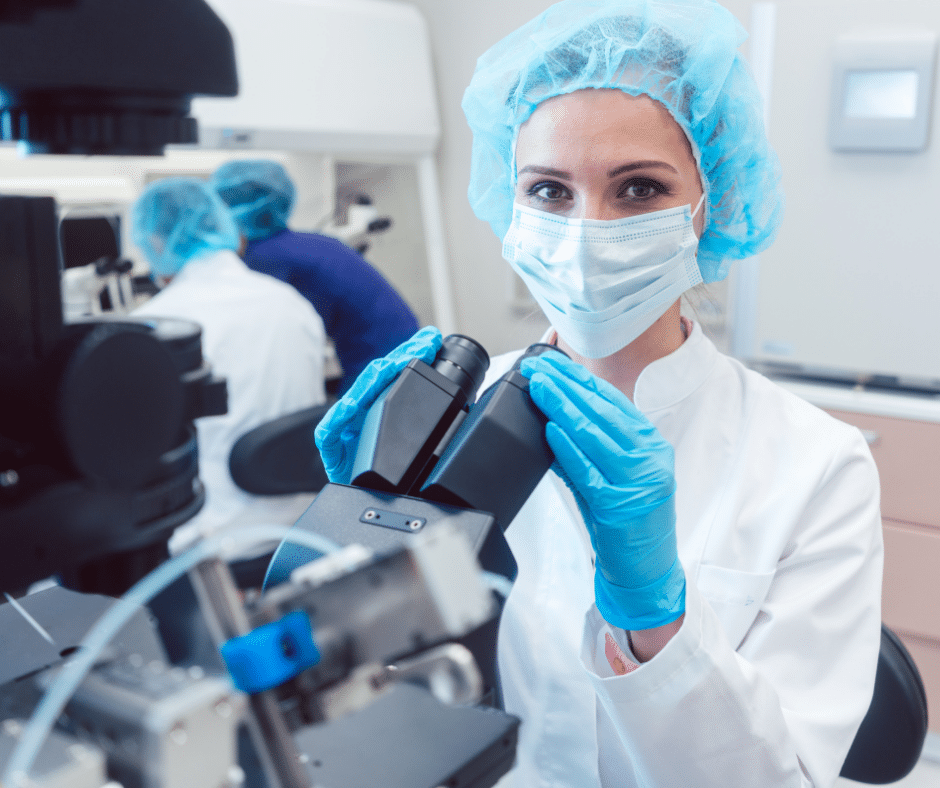In vitro fertilization (IVF) was developed as a method of assisting couples in becoming pregnant if they were unable to do it naturally.
In IVF, mature eggs are extracted from the ovaries by your doctor, then sent to the laboratory to be incubated by the embryologist in a nutritive culture medium and fertilized with sperm. One to three fertilized eggs are then transported to a uterus for further development. Extra embryos can be frozen and kept for several years for future use. Having frozen embryos on hand can reduce the cost and invasiveness of future IVF cycles.
The capacity to grow embryos outside of a woman's reproductive tract in a laboratory setting is indeed a tremendous scientific breakthrough. While you may not always be able to see what embryologists do during your IVF treatment, the care they provide for your eggs, sperm, and embryos is critical to the success of your procedure.
In this essay, I'll go over what embryologists perform 'behind the scenes' to assist women and couples in conceiving.
What function does an embryologist play in the treatment of infertility?
The role of an embryologist begins during the egg retrieval stage of the IVF process.
Egg Retrieval
The aspirated follicular fluid is taken to the IVF laboratory where the embryologist begins to examine under a microscope for the presence of oocytes, and each one is graded for maturity.
Before leaving the facility, the couple will be informed of the number of eggs that were recovered.
Follicular fluid oocytes are then extracted, rinsed, and deposited on culture dishes for insemination.
Dishes for oocyte culture should be prepared at least 6 hours ahead of time and labelled with the patient's ID.
Sperm Collection
The embryologist will remove the seminal plasma, debris, leftover cells, and dead sperm from the collected semen.
This is accomplished through a number of processes, which include the addition of sperm wash media and centrifugation.
The final solution with live and motile sperm will be inseminated to the culture media containing eggs to allow fertilization to occur.
Egg Insemination
After that, the dish is returned to the incubator for the night.
The day of egg collection and insemination is called day 0.
To boost the chances of fertilization, the embryologist may inject a single sperm straight into the woman's egg.
Intracytoplasmic sperm injection is the name of this procedure (ICSI).
ICSI involves injecting a single sperm into each egg using micromanipulation techniques.
About 3 hours after the egg is collected, the cells surrounding the egg are eliminated or denuded.
The embryologist can then determine the number of mature eggs.
Only developed eggs will be appropriate for injection.

Checking for Fertilization
The next day (referred as Day 1), the embryologist will look for evidence of fertilization (when the sperm and egg have fused and formed an embryo).
Normally, oocytes with two pronuclei (two circles in the middle of an embryo) are fertilized.
Embryo Culture
After that, the embryos are cultivated in a specific medium.
To optimize embryo development, the embryologist will do a complete examination of the culture conditions and replenish the media.
The embryologist uses an embryo grading system to assess the embryos on a daily basis.
Embryos are graded based on a variety of morphologic features, such as cell division rate, cell size and quantity, and the amount of cytoplasmic fragments present.
Embryo Transfer
As previously stated, embryo development is monitored for 3 to 5 days following fertilization, after which two or three embryos are usually implanted into the uterus.
Freezing and Storing Embryos
If a woman has numerous embryos after egg collection and insemination, she may need to freeze and store them.
Because only one to three embryos are implanted at a time, the embryologist freezes any remaining embryos in case implantation fails.
Cryopreservation is the name of the procedure.
Having stored embryos on standby can help future IVF cycles be less expensive and invasive.
The embryologist can also freeze and store eggs for women who want to preserve their future fertility by freezing their eggs.
Sperm can even be frozen.
This is crucial because it allows the clinics to keep a supply of donor sperm on hand for single women and couples (including lesbian couples) who rely on sperm donation to create their babies.
Genetic Testing
An embryologist follows strict quality-control standards on a daily basis, which are designed to keep the laboratory atmosphere perfect for embryo growth.
In specific circumstances, the embryologist performs preimplantation genetic testing (PGT) - a specialised technique that helps examine your eggs, sperm, and embryos so that the best ones are selected during IVF.
PGT is conducted before embryos are transferred to the uterus.
Its aim is to lower the likelihood of transferring an embryo with a certain genetic disease or chromosome abnormalities.
By carefully removing a small number of cells from a developing embryo, the embryologist can identify if an embryo is carrying a genetic illness (PGT-M), has the correct number of chromosomes (PGT-A), or has alterations in the size or arrangement of chromosomes.
These tests are not available at every fertility clinic because they necessitate the expertise of a highly skilled embryologist with specialized abilities.
While PGT is not for everyone, it can assist certain couples, such as those who have had a history of recurrent miscarriage or failed IVF cycles, achieve a successful pregnancy.
Before the embryo is implanted in your uterus, the embryologist can use genetic analysis to determine the sex of the embryo.
If you have a gender preference for your future child, this is the best method to do so.
Maintaining optimal laboratory conditions
With a variety of technologies, the embryologist carefully maintains the temperature inside the incubators and equipment needed to monitor the embryos.
The embryologist also checks the humidity and gas levels within these incubators, as well as the overall lab air quality.
He or she also looks after time-lapse incubators, which are used to optimize embryo growth and patient outcomes.
The embryologist also has a responsibility in maintaining the laboratory environment by looking after the frozen embryos, eggs, and sperm in cryo storage tanks to guarantee they remain alive.
The tanks are inspected regularly to guarantee that liquid nitrogen levels remain optimal, ensuring that frozen stock remains frozen.
Interactions with Patients
Embryologists don't just work in the lab.
They also have regular face-to-face contact with the patients, whether it's during the first consultation, during egg retrieval, to keep them updated on how their embryos are growing, or at embryo transfer.
The idea is to keep patients updated on the status of their embryos and how things are going in the lab at all times so that they may feel confident that their embryos are being appropriately cared for.

«The embryologist is, in my opinion, the most important person in the whole IVF process. The more experience the embryologist has to work with modern technologies, the better the success of the pregnancy.»
Conclusion: Working as an Embryologist is Gratifying
In many ways, working as an embryologist is gratifying.
It's a rewarding career, from the hurdles you face in lab work and data collection to the very emotional service you provide to families.
In fact, the best embryologist can flip between their analytical intellect in the lab and their emotional heart while interacting with their patients.
It's undoubtedly remarkable to see life begin under a microscope and emerge as a healthy newborn months later.
There are never two days that are the same! There are always new hurdles to overcome or victories to celebrate.
Besides, Embryology is always evolving, which means that embryologists must constantly learn new skills and adapt to new technology.
